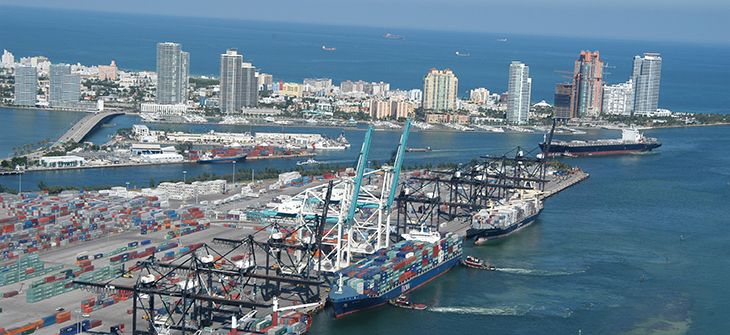- Nigerian Ports Handled 96.6 Million MT Cargo in H1
The Nigerian Maritime Administration and Safety Agency has declared that between January and June, total cargo throughput was 96,626,737.96 metric tonnes, representing an increase of 31.24 per cent from 73,628,546.62MT recorded in the corresponding period of 2017.
The Director General, NIMASA, Dr Dakuku Peterside, made this declaration in Lagos on Wednesday during an interactive session with the media.
Peterside attributed the increase to freight rates benchmark which was reviewed for three per cent levy billing to reflect prevailing realities in shipping, based on the request of operators.
He added that the new benchmark had succeeded in fostering harmonious regulator-operator relationship and brought about positive trends in the industry leading to more patronage.
The NIMASA DG who was giving account of the activities of the agency in the past six months said that it had started actualising its mandate by putting together a Strategic Implementation Plan in alignment with the programme of the Federal Government, aimed at putting the agency on a path of sustainable growth to impact the maritime industry as well as promote and ensure overall development of the sector.
Peterside explained that during the period under review, there was an increase in indigenous participation in Cabotage vessels manning, ownership building and registration as a result of zero tolerance on granting waivers.
He added, “We have also witnessed an increase in total number of wholly Nigerian-owned vessels on the Nigerian Cabotagae register. Half year result shows 125 vessels were registered representing a 33 per cent increase when compared with the 94 registered in the corresponding period of 2017.
He said the number of Nigerian seafarers placed on board vessels from January to June was 2337 representing a 58.9 per cent increase in the number of employed seafarers.
A total of 2,840 Nigerian officers and ratings were recommended to be placed on board Cabotage vessels in 2018 as against 1,789 in the same period in 2017, representing an increase of 58 per cent, Peterside noted.
Also, 150 cadets have commenced their on-board sea time training in the first phase of the Nigerian Seafarers Development Programme, in addition to 89 cadets who are currently on board training vessels facilitated by the South Tyneside College, United Kingdom, making a total of 239 cadets in the first phase of the programme.
Under the agency’s Survey, Inspection and Certification Transformation programme, Certificate of Competency examinations were conducted at the Maritime Academy of Nigeria, Oron, leading to the issuance of different categories of CoCs to successful candidates, he said.
“In 2017 alone, NIMASA issued 3,752 certificates to successful seafarers representing a 149 per increase from the CoCs issued in 2016,” he stated.
He listed other improvements recorded in the sector to include reduction of transaction time from 72 hours to 12 hours for dry cargo/RORO and manifest to six hours for wet/gas and bulk homogenous dry cargo.
Others are the development of a software that issues Ship Identification Number at the manifest desk to prevent double entry and double billing; and improved communication with stakeholders through dedicated electronic channel.
On the surveillance and patrol of the maritime domain, Peterside said that the fast intervention security vessels the agency leased under the maritime security strategy project were making impact.
He said, Port State inspections rose by 10.53 per cent in 2017 up from 475 in 2016 to 525 in 2017.
“Flag State inspections are also experiencing upswing from 77 in 2016 to 98 in 2017, a 27 per cent increase,” he added.
He said that the agency had been able to establish a satellite surveillance control and command centre that has a coverage of up to 312 nautical miles from coast, adding that the system can detect vessels with AIS transponders switched off as a synthetic aperture raider.
The agency secured the reactivation of the maritime domain awareness capability and this has enabled effective enforcement of regulations, he said, adding, “Our surveillance system enables us to ensure the preservation of Cabotage trade for indigenous operators by identifying and differentiating ship-to-ship operations that take place at the secured anchorage and the offshore locations to avoid foreign domination in the Cabotage trade under the guise of STS.”
NIMASA according to him has continued the clamour for a change of terms of trade from Free on Board to Cost Insurance and Freight for the affreightment of Nigerian crude oil cargo.
Meanwhile, NIMASA has disclosed that it was planning to outsource the management of its modular floating dockyard to private individuals.
A floating dockyard is an equipment or platform that can be towed to a particular location, to allow a vessel to be floated in and drained to rest on a dry platform.
Peterside said that the dockyard would be located at a Naval facility in Lagos owing to the initial challenge of trying to locate it in the Niger Delta region.
The agency took delivery of the multi-million dollar floating dockyard from Europe in June.

 Billionaire Watch3 weeks ago
Billionaire Watch3 weeks ago
 Startups4 weeks ago
Startups4 weeks ago
 News4 weeks ago
News4 weeks ago
 News4 weeks ago
News4 weeks ago
 Bitcoin4 weeks ago
Bitcoin4 weeks ago
 Naira4 weeks ago
Naira4 weeks ago
 Forex3 weeks ago
Forex3 weeks ago
 Treasury Bills4 weeks ago
Treasury Bills4 weeks ago

























